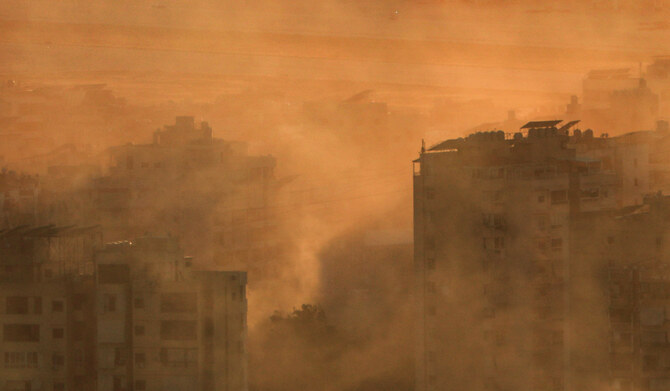JERUSALEM: The Israeli military said about 70 projectiles were identified crossing from Lebanon into Israel within minutes on Sunday, following its attack on Beirut.
“Following the sirens that sounded between 11:09 (0809 GMT) and 11:12 am in the Western Galilee and Upper Galilee areas, approximately 70 projectiles were identified crossing from Lebanon,” the military said. On Thursday, Hezbollah had vowed to launch a new “escalatory phase” in its war with Israel.
Hezbollah said it launched rockets on Sunday at an Israeli army base east of the northern town of Safed.
Hezbollah fighters fired “a big rocket salvo” at an Israeli army base east of Safed, the group said, adding the attack was “in defense of Lebanon” and “in response to the Israeli enemy’s attacks on villages and homes.”
The Israeli military said it carried out a strike Sunday on a Hezbollah command center and underground weapons facility in the Lebanese capital Beirut.
“Earlier this morning (Sunday), the IAF (Israeli air force) conducted an intelligence-based strike on a command center of Hezbollah’s intelligence headquarters and an underground weapons workshop in Beirut,” the military said in a statement.
Lebanese state media reported two Israeli strikes on Sunday morning in Haret Hreik and one in Hadath — all in Hezbollah’s southern Beirut stronghold of Dahiyeh after the Israeli army warned civilians to evacuate the stronghold of Lebanon’s Hezbollah movement.
The Israeli military said it also killed three Hezbollah militants in other strikes in southern Lebanon where it says its troops are engaged in targeted raids.
The Israeli army earlier ordered civilians located near buildings it said were “affiliated with Hezbollah” in two neighborhoods in south Beirut to immediately evacuate early Sunday, marking the facilities on two maps and saying the military would “work against” them soon.
The “urgent warning” was issued by the military’s Arabic spokesman Avichay Adraee, and concerned the neighborhoods of Haret Hreik and Hadath.
“You are located near facilities and interests affiliated with Hezbollah, which the IDF will work against in the near future,” Adraee said on Telegram.
“For your safety and the safety of your family members, you must evacuate the building and those adjacent to it immediately and move away from it for a distance of no less than 500 meters.”
Similar warnings have preceded Israeli air strikes in recent weeks after Israel stepped up its campaign against Iran-backed Hezbollah, which has a stronghold in the southern suburbs of the Lebanese capital.s
Strikes on south Lebanon
Israel struck dozens of south Lebanon villages and towns overnight and targeted Nabatiyeh city for a third time this week, Lebanese state media said on Sunday.
“Warplanes struck... the city of Nabatiyeh seven times” including on an inhabited building, with rescuers still looking for survivors under the rubble, the official National News Agency said.
The city where Hezbollah and ally Amal hold sway had seen deadly Israeli strikes on Wednesday that killed its mayor, with bloody attacks last week razing its marketplace.
It added that Israeli jets “conducted strikes” on more than 50 towns and villages including the border villages of Kfarshuba, Bint Jbeil and Khiam that have seen heavy fighting, reporting casualties.
“Israeli troops blew up the Tarrash neighborhood in Mais Al-Jabal,” a border village where Hezbollah has clashed with Israeli soldiers, “after booby-trapping it with highly explosive materials,” the NNA said.
The troops “bulldozed the cemetery in the village of Blida” nearby, the NNA added.
Israel and Hezbollah, an ally of the Palestinian militant group Hamas, had been trading near-daily fire across the Lebanese border since the outbreak of the war in Gaza last year.
But Israel sharply escalated its campaign late last month, launching devastating air strikes and deploying ground forces.
Since late September, the war has killed at least 1,454 people in Lebanon, according to an AFP tally of Lebanese health ministry figures.

























